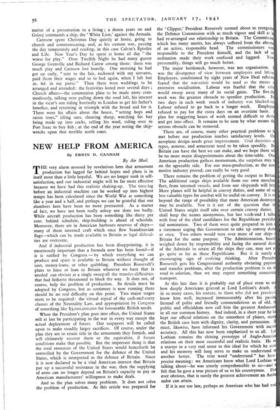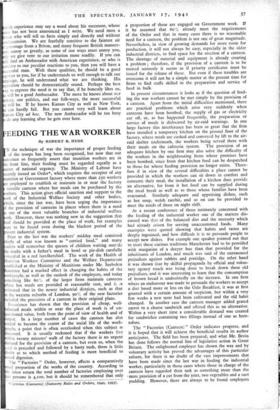NEW HELP FROM AMERICA
By ERWIN D. CANHAM By Air Mail.
THE very alarm aroused by revelations here that armament production has lagged far behind hopes and plans is in itself more than a little hopeful. We are no longer sunk in self- satisfaction, and our industrial might will be far more effective because we have had this realistic shaking-up. The time-lag before an industrial machine can be worked up into highest tempo has been calculated since the World War at something like a year and a half, and perhaps we can be grateful that our slumbers here have been no more protracted. As a matter of fact, we have not been really asleep nor done too badly. While aircraft production has been something like thirty per cent. behind schedule, ship-building is ahead of schedule. Moreover, there are in American harbours reserves of ships— many of them interned craft which once flew Scandinavian flags—which can be made available to Britain as legal difficul- ties are overcome.
And if industrial production has been disappointing, it is enormously important that a formula now has been found—if it is ratified by Congress — by which everything we can produce and spare is available to Britain without thought of cost, money-loans, or other quibbling. President Roosevelt's plans to lease or loan to Britain whatever we have that is needed can obviate at a single sweep all the transfer-difficulties that had hitherto threatened to block the way. It does not, of course, help the problem of production. Its details must be adopted by Congress, but as sentiment is now running there should be no real difficulty on this point. Two major stages seem to be required: the virtual repeal of the cash-and-carry clauses of the Neutrality Law, and appropriation by Congress of something like $3,000,000,000 for foreseeable British needs.
When the President's plan goes into effect, the United States will at last be participating in the war in every way except the actual deployment of forces. Our taxpayers will be called upon to make steadily larger sacrifices. Of course, under the plan they are to retain title in the armaments they furnish, and will ultimately recover them or the equivalent, if future conditions make that possible. But the important thing is that the total resources of the United States would henceforth be controlled by the Government for the defence of the United States, which is interpreted as the defence of Britain. Since it is now declared to be a vital American interest that Britain put up a successful resistance in the war, then the supplying of arms can no longer depend on Britain's capacity to pay or American manufacturers' willingness to make deals.
And so the plan solves many problems. It does not solve the problem of production. As this article was prepared for the ' Clipper,' President Roosevelt seemed about to reorga the Defence Commission with as much vigour and skill as had re-arranged our relationship to Britain. The Commissi which has many merits, has always suffered from the absen of an active, responsible head. The commissioners we responsible to the President himself, and the lack of ordination made their work confused and laggard. Now presumably, things will go much better.
The major bottleneck, however, was not organisation. was the divergence of view between employers and labo Employers, conditioned by eight years of New Deal refor feared that the war-crisis would be used as the means extensive socialisation. Labour was fearful that the cri would sweep away many of its social gains. The five-d week was the greatest obstacle to speedier production. F two days in each week much of industry was blacked-ou Labour refused to go back to a longer week. Employ refused to pay for the extra days on an overtime basis. plan for staggering hours of work seemed difficult to de and get into effect. It remains to be seen by what means serious obstacle can be removed.
There are, of course, many other practical problems to met before our production reaches satisfactory levels. 0 aeroplane design needs great improvement. Vital decisions types, armour, and armament need to be taken speedily. B Britain can have the best we can make, and we hope there u be no more major disappointments about the time-table. On. American production gathers momentum, the surprises may on the agreeable side. For our mass-production, as the aut motive industry proved, can really be very good.
There remains the problem of getting the output to Brita. The additional cargo ships available from our own merch fleet, from interned vessels, and from our shipyards will hei More planes will be helpful in convoy duties, and some of o less valuable types for combat will be useful on convoy. It is n beyond the range of possibility that more American destroy.o may be available. Nor is it out of the question that United States might itself take over certain convoy duties. shall keep the names anonymous, but last week-end I talk with four of the chief candidates for the Republican preside tial nomination. Two of them were quite prepared to join a statement urging this Government to take up convoy duff• at once. Two others would turn over more of our ships Britain for the same purpose. The Administration, hea weighed down by responsibility and facing the natural des' of the Admirals to retain all the ships they can, may not go quite so far as these Republicans. But it is surely encouraging sign of evolving thinking. After Presid Roosevelt gets his Congressional authority obviating paymmd and transfer problems, after the production problem is on road to solution, then we may expect something concer transport.
At this late date it is probably out of place even to ni how deeply Americans grieved at Lord Lothian's death. in so many cases, his stature, to those who did not previou know him well, increased immeasurably after his pass Instead of polite and friendly commendations as of old, public and officialdom now call him the greatest Ambassa in all our common history. And indeed, in a short year he kept our official relations on the smoothest of planes, stay the British case here with dignity, clarity, and persuasion. must, likewise, have informed his Government with incisi accuracy. All this has now been emphasised to us all. Lu Lothian remains the shining prototype of Anglo-Ameri relations on their most successful and realistic basis. He a martyr in a very real sense to this ideal for which he stir and his memory will long serve to make us understand another better. The trite word "understand " has here precise meaning • we Americans knew what Lord Lothian talking about—he was utterly comprehensible to us—and felt that he gave a true picture of us to his countrymen. H ever obvious, that is surely the greatest achievement an Am sador can attain.
If it is not too late, perhaps an American who has had in ritish experience may say a word about his successor, whose ame has not been announced as I write. We need most a ritun who will tell us facts simply and directly and without ondescension. We are fearfully sensitive to the faintest air f patronage from a Briton, and, many frequent British manner- ins annoy us greatly, as some of our ways must annoy you; nlv we give vent to our irritation more readily. If you •can niv find an Ambassador with American experience, or who is si rive to our peculiar reactions to you, then you will have a uccessful .man. With these qualities, he should be a good eporter to you, for if he understands us well enough to talk our nguage, he will understand what we are thinking. His eputation should be democratically sound. Perhaps the best 'ay to express the need is to say that, if he honestly likes us, e will be a good Ambassador. The more he knows about our istory, our politics, and our folk-ways, the more successful e will be. If he knows Kansas City as well as New York, e can hardly fail. But you cannot very well learn about ansas City ad hoc. The new Ambassador will be too busy o do any learning after he gets over here.































 Previous page
Previous page